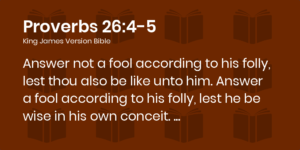Answer not a Fool According to his Folly
“Answer not a fool according to his folly, lest thou also be like unto him. Answer a fool according to his folly, lest he be wise in his own conceit.” (Proverbs 26:4-5 KJV)
“Aha!” exclaimed the atheist, “See here is a contradiction!” Not so fast my friend! There are a number of ways to reconcile this apparent contradiction. First, we need to acknowledge that this could only be a contradiction if the writer is using the same words in the same sense. Words often have more than one meaning, e.g., cool, literally, love. Is the writer using the phrase, “according to his folly” in the same sense in each verse? “According to” in verse four could mean answering him by descending to his level of irrationality and in verse five it could mean addressing the foolishness itself while remaining rational. Second, we need to understand the nature of a proverb. They are each inspired of God, yet they are not meant to apply in every circumstance. They are only true when and where they apply.
Is the writer acknowledging that there are more than one kind of circumstance in which one may encounter a fool and his folly? Is he saying there are more than one way of dealing with them? I believe so in both cases. Under the right circumstances, answering a fool “according to his folly” can make the fool see the irrationality of his actions or words. Under the wrong circumstances, answering a fool “according to his folly” may make both of you look silly. There is a time and place to properly rebuke a fool but there may also be a foolish time to do so. Wisdom will allow you to know the difference between the two.
Read Matthew 21:23-27; 22:15-22
